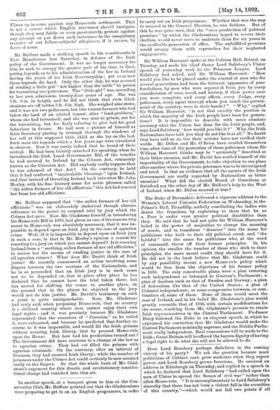Mr. Balfour supposed that "the sullen furnace of her old
afflictions" was an elaborately rhetorical though obscure reference to the power to suspend trial by jury which the Crimes Act gave. Now, Mr. Gladstone himself, in introducing his Home-rule Bill in 1886, had given as one of the reasons why resort to Home-rule was absolutely necessary, that it was im- possible to depend upon an Irish jury in the case of agrarian crime. Well, if it is impossible to depend upon an Irish jury in such a case, is that in Mr. Morley's opinion a reason for resorting to a jury on which you cannot depend ? Is it rescuing Ireland from a "seething, sullen furnace of her old afflictions," to secure her the means of evading justice in the case of all agrarian crimes ? What does Mr. Davitt think of Irish juries? He recently commenced an action involving some dispute between the two sections of the Nationalists, and he is so persuaded that an Irish jury is in such cases not to be depended on, that in place after place he has declared that he cannot have the trial taken there, but has moved for shifting the venue to another place, on the ground that in the places he objected to, the jury would not do him justice. Mr. Davitt's testimony on such a point is quite unimpeachable. Now, Mr. Gladstone had truly said, when proposing Home-rule, that no country is a civilised country where men cannot enjoy their own legal rights ; and it was precisely because Mr. Gladstone represented that the resources of "Coercion," as he called it, were exhausted, and because he predicted that further re- course to it was impossible, and would fill the Irish prisons without securing Irish liberty, that he pressed Home-rule upon the House. But how had his predictions turned out The Government did have recourse to a change of the law as to agrarian crime. They had not filled the prisons with agrarian criminals. On the contrary, after an interval of firmness, they had secured Irish liberty; while the number of prisoners under the Crimes Act could certainly be now counted easily on the fingers. So that the whole basis of Mr. Glad- stone's argument for this drastic and revolutionary constitu- tional change had vanished into thin air,






































 Previous page
Previous page